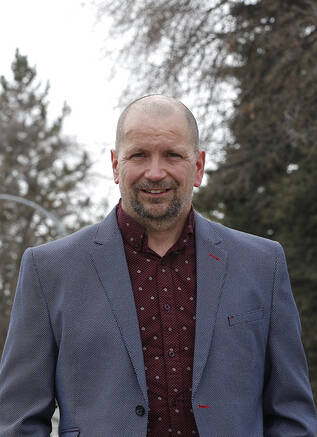Councillor seeks support for reconciliation donation fund
Advertisement
Read this article for free:
or
Already have an account? Log in here »
To continue reading, please subscribe:
Monthly Digital Subscription
$0 for the first 4 weeks*
- Enjoy unlimited reading on winnipegfreepress.com
- Read the E-Edition, our digital replica newspaper
- Access News Break, our award-winning app
- Play interactive puzzles
*No charge for 4 weeks then price increases to the regular rate of $19.00 plus GST every four weeks. Offer available to new and qualified returning subscribers only. Cancel any time.
Monthly Digital Subscription
$4.75/week*
- Enjoy unlimited reading on winnipegfreepress.com
- Read the E-Edition, our digital replica newspaper
- Access News Break, our award-winning app
- Play interactive puzzles
*Billed as $19 plus GST every four weeks. Cancel any time.
To continue reading, please subscribe:
Add Free Press access to your Brandon Sun subscription for only an additional
$1 for the first 4 weeks*
*Your next subscription payment will increase by $1.00 and you will be charged $16.99 plus GST for four weeks. After four weeks, your payment will increase to $23.99 plus GST every four weeks.
Read unlimited articles for free today:
or
Already have an account? Log in here »
Hey there, time traveller!
This article was published 16/04/2022 (1334 days ago), so information in it may no longer be current.
A CITY councillor is asking Winnipeg to consider a voluntary fund for homeowners to donate to reconciliation efforts as part of their property taxes.
Shawn Nason (Transcona) said he was inspired by Victoria moving forward on a similar fund, which will ask homeowners if they would like to add between five and 10 per cent on top of their annual property tax to go to First Nations in the B.C. city.
Nason’s motion, which references the Victoria initiative and suggests that Winnipeg “adopting a similar approach would help foster a journey of reconciliation,” will be put forward to the upcoming East Kildonan-Transcona community committee meeting April 25.

If members vote in favour of making the recommendation, it would go to the executive policy committee, which would have to then refer to the Winnipeg Public Service, which would have 180 days to put together a report on such a fund’s feasibility and possible purposes.
“It’s one of those things, I don’t see a harm in it. It’s voluntary, some people may wish to contribute to this and see great value; others… have sounded off (that) this is a federal government responsibility,” Nason told the Free Press.
“Those individuals obviously are not aware that reconciliation involves all of us, at all levels of government.”
It wouldn’t be tax deductible — unless the public service suggests this, Nason said — and would be used on top of the reconciliation initiatives already funded by taxpayers. Ideally, the city councillor said, the creation of the fund would happen after conversations with Indigenous leadership in Winnipeg.
When asked if he had reached out to any Indigenous leadership prior to announcing the motion, Nason said he’d connected “informally” with Southern Chiefs’ Organization Grand Chief Jerry Daniels.
Brian Kelcey, an urban policy consultant who previously worked as a special adviser to then-mayor Sam Katz, called the idea easy to do and a good idea in theory. It’s not uncommon to see cities with a voluntary contribution line on their property tax forms, but its unlikely to create a large amount of revenue in action, he said.
“I think the logistics and the spirit of it are a little more clear in Victoria, and you’re dealing with the City of Victoria itself as a relatively small city, where it’s going to be really clear who the money’s going to in a circumstance like that,” he said.
Considering Victoria hasn’t even put the practice in place yet, there isn’t a lot of empirical evidence to prove it’ll be effective, Kelcey said.
“It might be more effective if you looked at something like a foundation structure, where people were getting tax credits from making larger contributions. Or more to the point… having a broader and more comprehensive reconciliation strategy to solve problems that the city’s expected to solve, might be more effective.”
Nason said should the report be requested, residents would have the opportunity to submit where they’d like to see the money go.
“It could be to support specific events on (National Day for Truth and Reconciliation) that are over and above what we’re already doing. It could be for monuments,” he said. “The report will come back to inform us.
“The city has multiple reserves for various undertakings… this is just a reserve that I envision as an opportunity to further our reconciliation efforts.”
The idea was “exciting” for Isabel Daniels, a wellness co-ordinator at Ndinawe Youth Resource Centre (a non-profit that works with at-risk Indigenous youth in Winnipeg), but also elicited concern it would go to superficial projects instead of into the hands of people who need it.
“We don’t need another monument. Monuments aren’t changing our lives,” she said, adding supports for Winnipeg’s homeless population would be more valuable.
“We have a lot of derelict buildings around the city — let’s fix them up and put people in them.”
malak.abas@freepress.mb.ca

Our newsroom depends on a growing audience of readers to power our journalism. If you are not a paid reader, please consider becoming a subscriber.
Our newsroom depends on its audience of readers to power our journalism. Thank you for your support.


